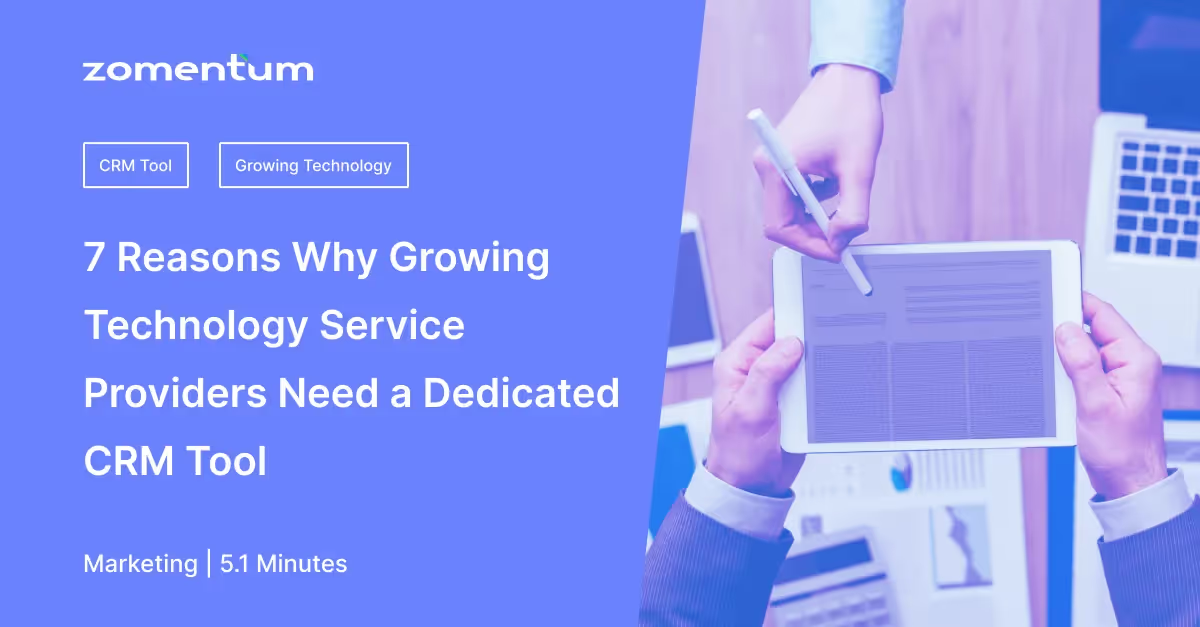7 Reasons Why Growing Technology Service Providers Need a Dedicated CRM Tool

As competition increases in the technology services space, it becomes more critical than ever for technology service providers to ensure they operate as efficiently as possible. Efficiencies are critical not only from a technical delivery standpoint but also from a sales perspective.
The easiest way to streamline your sales activities is to use a customer relationship management (CRM) system. A CRM system helps you manage all of your customer interactions and data in one place.
But many technology service providers still use makeshift CRM systems. They’re cobbled together from various applications like Excel spreadsheets, Outlook contact lists, or their professional services automation (PSA) software. While these solutions may work “adequately” for smaller technology businesses with a limited sales pipeline, they quickly become overwhelmed as the business grows.
Here are seven reasons you need a dedicated CRM system to manage your sales pipeline.
1. It Centralizes Your Client Information in One Contact Database
With a CRM, you can keep all customer information and history in a central database that’s accessible at any time to every team member. This helps you avoid duplicate efforts when contacting a customer because you can see previous conversations they've had with other staff members.
Gone are the days of spending too much time sifting through multiple data sources to find information related to a client’s account. By using a CRM, you can track everything from contact details to company information and revenue history, all in one place.
2. It Manages All Communications With Your Prospects
A CRM keeps track of all the interactions you have with your sales leads. These details include emails, phone calls, notes from face-to-face meetings, and any other information relevant to your relationship with them. It also includes the primary point of contact and the name of the person who has final decision-making authority.
By having a CRM, it’s easier to hold personalized conversations because you can see a quick snapshot of the person’s background before you call them or send them an email. For example, you can track a contact’s birthday or anniversary date so that you can deliver a friendly and personalized greeting.
3. It Automates Follow-ups and Data Entry
Managing all of these interactions manually can seem overwhelming at first. Most CRM platforms have built-in automation features to make them much more manageable. You can set up workflows made up of steps like “email lead,” “follow up after three days with a phone call,” or whatever else works for your business.
Once your workflows are set up, the CRM handles the follow-ups for you, so no opportunity is forgotten. Because all the data is entered into the CRM automatically, you get a complete history of all interactions with each prospect. So instead of taking three hours each week to manage your leads, you can do it in 15 minutes!
4. It Segments Your Contact Lists
Some CRM software can use data collected over time to categorize contacts. With such segmentation, you can build a list of people to contact based on specific criteria. For example, you might search for contacts using a filter based on location, company size, or deal stage.
You can also create customized segments. You may want to send an email campaign to people who tend to purchase certain products, or you might make a segment for customers who visit a particular page on your website.
Some CRM software vendors are planning to take this a step further using machine learning algorithms to create a filter based on a list of leads that show similar buying patterns as previous high-value customers. For instance, once the algorithm has identified 50 leads most likely to buy, it will automatically place them into a new marketing campaign.
5. It Automates Forecasting and Reporting
A CRM can also automate your forecasting and reporting processes. By tracking deals through their life cycle, you can generate reports that show how much business you're doing now, what your average deal size is, and how many new leads you need to close so you can reach your sales targets.
You can see how your forecasts compare to the actual revenue generated from closed deals. With that information, you can adjust staffing levels or marketing campaigns as needed.
You can also generate reports for existing customers based on criteria, such as the amount of revenue generated last month or their average deal size over the past three years. Or, you might want a list of deals that are in danger of falling through because the customer hasn’t responded to a predetermined number of follow-ups. Whatever report you need, your CRM can provide it.
6. It Integrates With Your Other Applications
A good CRM integrates easily with the other software applications you’re using, such as your email marketing platform or PSA system. Data can be automatically synced, and there’s less risk of duplicate data entry. The goal is to have a single system where all your customer data is stored.
When you can see all interactions a customer has had with your company, it’s much easier to provide them with an excellent customer experience. You can quickly pull up past communications and transactions in one place and offer solutions or suggestions that are tailored to their specific needs.
7. It Gives You a 360-degree View of Your Customer Base
An effective CRM has an easy-to-use interface where all the information is presented in one place. This way, it’s simple to access everything you need to know about each prospect and customer, including their contact information, company details, revenue history, and open deals.
With this 360-degree view of your customer base, you can make more informed decisions about how to market to them and know which products or services to offer. You can also be better positioned to identify opportunities for up-selling and cross-selling.
Less Work, Better Customer Service
A good CRM helps automate many aspects of customer management and provides a central source of information that you can access at any time. Implementing a CRM means less work for you and better service for your customers. With the right CRM system in place, everyone wins.
Suggested Blogs

How to Write a Business Proposal That Actually Wins Deals

What’s new in Zomentum - December 2019
.avif)
